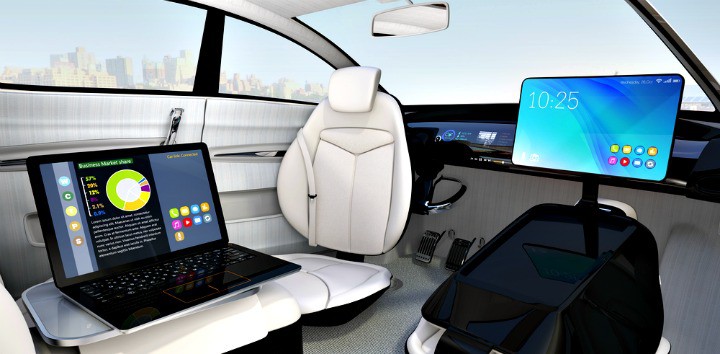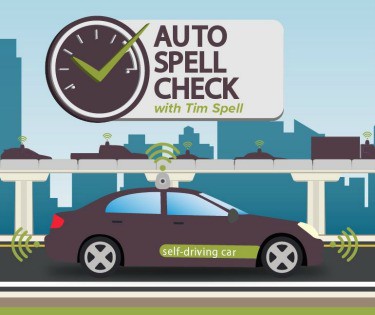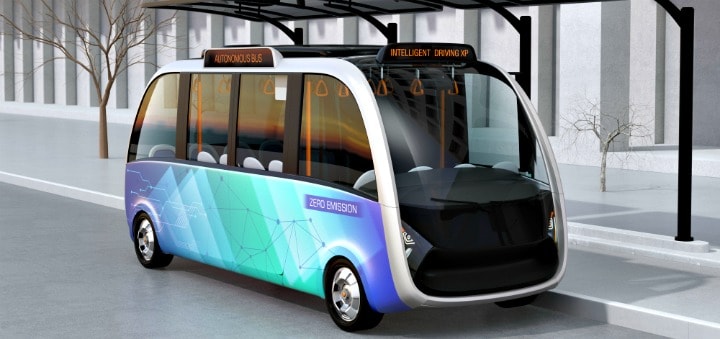Survey: Driverless Cars Safer Than Texting Drivers

Automobile manufacturers are heavily investing in technology and research to put autonomous vehicles on the road soon. While industry experts agree that driverless cars will someday be mainstream transportation, the short-term gamble is whether consumers will have sufficient confidence in automated vehicle technology.
This question is at the heart of a 2019 nationwide survey by insuranceQuotes titled, “Who Do You Trust More: Man or Machine?”
This is insuranceQuotes’ second-annual study on consumer attitudes, perceptions and predictions surrounding autonomous vehicles. Much has occurred since the initial study, which should contribute to better-informed responses.
CHECK OUT: Is Traffic About to Become Extinct?
Over the past year, consumers have become more educated about AVs through increased news coverage of the vehicles. More drivers also have had the opportunity to experience elements of autonomous motoring with the greater availability of production semiautonomous vehicles equipped with sophisticated driver-assist features.
In 2018, select cities nationwide became testing grounds for commercial AV applications such as public transportation, ride-hailing services, and food and freight delivery.

The insuranceQuotes survey provides insights into varying scenarios in which consumers might accept or reject driverless transportation. The degree of trust in AVs, engineered to stay on task, versus distracted drivers is one of the situations explored.
Distraction comes in many forms, but the National Highway Traffic Safety Administration reports: “Texting is the most alarming distraction. Sending or reading a text takes your eyes off the road for 5 seconds. At 55 mph, that’s like driving the length of an entire football field with your eyes closed.”
According to the survey, most Americans would prefer to place their trust in artificial intelligence than in a distracted driver. Three-quarters, or 73 percent, of consumers say riding in a vehicle where the driver is texting is more dangerous than being a passenger in a self-driving vehicle.
Half of drivers worry about tech failure
This finding is striking considering the skepticism many Americans have when it comes to the safety of autonomous cars. For instance, 51 percent of those surveyed say their biggest concern about self-driving vehicles is the possibility of technology error or failure.
This apprehension has likely been influenced by negative high-profile news stories such as the self-driving Uber SUV striking and killing a bicyclist in Arizona, and fatal crashes involving semiautonomous Tesla vehicles being driven in autopilot mode.
Respondents had additional concerns about driverless vehicles: 22 percent are most uneasy about data security or hacking; 13 percent are most concerned about job loss in the transportation sector; and 9 percent worry most about unattainable purchasing costs. Initially, buying vehicles with self-driving technologies will be costly, but increasing competition among suppliers, hardware produced in higher volumes and developments in technology will eventually lower the cost of AV ownership.
Proving safety key to future of driverless cars
As technology advances, there will be a day when traffic accidents decrease as the result of the adoption of autonomous vehicles. However, this ideal is still on the horizon: research from the Society for Risk Analysis suggests that the public will not generally accept driverless technology unless it is shown to be four to five times as safe as human-driven vehicles. Since NHTSA findings indicate that 94 percent of automobile crashes are a result of driver error, odds appear strong for making future cases in favor of well-tested autonomous technology versus human-operated automobiles.
Skepticism of today’s autopiloted vehicles is reflected in InsuranceQuotes.com’s findings: while 37 percent of Americans would consider owning or leasing a self-driving vehicle in the future, just 32 percent trust the self-driving technology in use today, compared to the 47 percent that expect to trust the technology in use 10 years from now.
Young drivers pave way for AV acceptance
Young drivers, who stood out in the first study for voicing the greatest AV confidence, again emerge as the strongest proponents of driverless technology. Findings indicate a majority, 52 percent, of 18-to-34-year-olds would consider owning or leasing a self-driving vehicle. Similarly, the initial study reports: Of those aged 18 to 34, 55 percent would be comfortable riding in a self-driving car and 45 percent feel safer sharing the road with such vehicles, compared to 36 percent and 31 percent for the general population, respectively.
RELATED: These Driverless Features Are Available Today
The new study finds that older generations appear less receptive to driverless transportation. Thirty-eight percent of Americans between the ages of 35 and 44, 39 percent between the ages of 45 and 54, and 33 percent between the ages of 55 and 64 would consider owning or leasing a self-driving vehicle. Least eager to try out the technology are Americans ages 65 and older, or 22 percent.
In addition, the 18-to-34-year-old demographic also is most likely to trust the self-driving technology in use today, 40 percent, compared to 31 percent of those between the ages of 35 and 44, 32 percent of those between the ages of 45 and 54, and 31 percent between the ages of 55 and 64. Meanwhile, only 23 percent of Americans ages 65 and older trust today’s technology.

The importance for the older generation to feel secure in a vehicle is demonstrated in a AAA study that indicates Baby Boomers are more likely to indicate safety as a reason they want semiautonomous driver-assist features on their next vehicle (89 percent vs. Millennials 78 percent). “Millennials are more likely to cite convenience (75 percent) and wanting the latest technology (36 percent) compared to older generations.”
With Millennials expressing the strongest inclination to take driverless technology for a spin, it appears that younger generations are paving the road for a future where autonomous vehicles could become the norm. Their demand for convenience and the newest technology are factors pushing AV transportation forward, but the important first step is convincing consumers in general of the superior safety benefits of automated cars.
“Driver-assistance technologies in today’s motor vehicles are already helping to save lives and prevent injuries,” states NHTSA. “The continuing evolution of automotive technology aims to deliver even greater safety benefits and – one day – deliver Automated Driving Systems that can handle the whole task of driving when we don’t want to or can’t do it ourselves.”

Methodology:
This study was conducted for insuranceQuotes.com via telephone by SQL Server Reporting Services. Interviews were conducted from January 15-20 2019, among a sample of 1,015 respondents in English (980) and Spanish (35). The margin of error for total respondents is +/-3.66 percent at the 95 percent confidence level. All data are weighted to represent the adult U.S. population.
